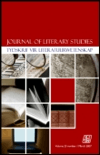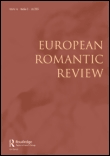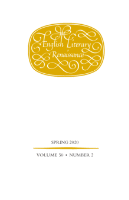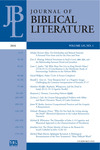
Verbum
Scope & Guideline
Advancing Knowledge in Linguistics and Cultural Studies
Introduction
Aims and Scopes
- Interdisciplinary Literary Analysis:
Verbum emphasizes the intersection of literature with other disciplines, such as history, sociology, and linguistics, allowing for comprehensive examinations of texts and their cultural implications. - Focus on Gender and Identity:
The journal regularly addresses themes related to gender, identity, and representation, reflecting contemporary societal discussions and feminist literary criticism. - Cultural and Historical Contextualization:
Verbum seeks to contextualize literary works within their cultural and historical settings, analyzing how these contexts influence narrative structures and themes. - Linguistic Studies:
The journal includes studies on language use, linguistic evolution, and the socio-linguistic dimensions of literary texts, highlighting the intricate relationship between language and literature. - Ecocriticism and Environmental Literature:
An emerging area of focus within the journal is ecocriticism, exploring literature's engagement with ecological themes and the representation of nature in various literary forms.
Trending and Emerging
- Digital Discourse and Social Media:
The analysis of digital discourse, particularly in relation to movements like #MeToo, has gained traction, showcasing how literature interacts with contemporary social movements and digital communication. - Interdisciplinary Approaches to Literature:
There is a growing trend towards interdisciplinary methodologies that combine literary analysis with fields such as sociology, history, and environmental studies, reflecting a holistic understanding of literature. - Ecopoetics and Environmental Narratives:
An emerging focus on ecopoetics and the representation of nature in literature highlights the increasing relevance of environmental themes in contemporary literary discourse. - Exploration of Otherness and Identity:
Themes related to otherness, cultural identity, and the complexities of belonging are becoming more prominent, reflecting a globalized world and diverse narratives. - Linguistic Identity and Multilingualism:
Research on linguistic identity, particularly in multilingual contexts, is trending, addressing the nuances of language in shaping identity and cultural expression.
Declining or Waning
- Traditional Canonical Literature:
There has been a noticeable decline in analyses centered solely on traditional canonical texts, as the journal increasingly emphasizes contemporary works and diverse voices. - Historical Linguistics:
While linguistic studies remain a core focus, the specific theme of historical linguistics is appearing less frequently, suggesting a move towards more applied linguistic studies relevant to modern contexts. - Nationalistic Literature:
The exploration of literature through a strictly nationalistic lens seems to be waning, with a shift towards more global and transnational perspectives in literary analysis. - Static Gender Roles in Literature:
Earlier discourse around static representations of gender roles is becoming less frequent, as the journal moves towards dynamic explorations of gender fluidity and intersectionality. - Formalist Literary Criticism:
There is a declining interest in purely formalist approaches that focus on structure and style, as the journal increasingly integrates socio-political contexts into its literary analyses.
Similar Journals

Journal of Literary Studies
Fostering interdisciplinary insights in literature.Journal of Literary Studies, published by UNISA PRESS, is a premier open access journal dedicated to advancing the field of literature and literary theory. With its ISSN 0256-4718 and E-ISSN 1753-5387, the journal has established itself as a leading platform for innovative research since its inception in 1985, with a notable convergence period running through to 2024. Recognized in the Q1 quartile of literature and literary theory, the journal ranks impressively at #236 out of 1106 in its category according to Scopus, highlighting its impact in the arts and humanities with a percentile rank of 78th. The journal's open access model, adopted in 2022, reflects its commitment to accessibility and dissemination of knowledge globally, making it an essential resource for researchers, academics, and students alike. With an editorial focus on interdisciplinary approaches and contemporary critical discourse, the Journal of Literary Studies serves as a vital vessel for the exchange of ideas and scholarly dialogue in the intricate landscape of literary studies.

STUDI FRANCESI
Advancing Discourse in Humanities since 1967STUDI FRANCESI, published by Rosenberg & Sellier, is an esteemed journal in the fields of Cultural Studies, History, and Literature and Literary Theory. With an ISSN of 0039-2944, this journal has been a significant contributor to scholarly discourse since its inception in 1967. Operating from Turin, Italy, STUDI FRANCESI aims to explore and critical analyze the interplay between culture, literature, and historical context, reflecting diverse methodologies and perspectives that shape our understanding of the humanities. Despite being classified in Q4 quartiles according to the latest metrics, it offers a unique platform for emerging voices and innovative research, thus serving both seasoned academics and new researchers keen to delve into the nuances of Italian and European cultural heritage. Journals of this caliber are crucial for fostering academic dialogue and expanding the frontiers of knowledge, making it an invaluable resource for students, professionals, and scholars alike.

European Romantic Review
Delving into the Rich Tapestry of Romantic IdealsEuropean Romantic Review is a distinguished journal published by Routledge Journals, Taylor & Francis Ltd, focusing on the critical exploration of Romantic literature and its cultural impact. Since its inception in 1990, the journal has been a vital platform for scholarly discourse in the fields of Cultural Studies and Literature and Literary Theory, with an esteemed ranking in the 61st percentile for its contributions to the literature domain. Despite not being open access, European Romantic Review provides valuable insights to researchers, offering a rich repository of articles that engage with the complexities of Romantic thought, authorship, and aesthetics. The journal's commitment to advancing academic knowledge makes it an essential read for scholars, professionals, and students interested in the nuances of the Romantic era and its lasting influence on contemporary discourse.

Studia Universitatis Babes-Bolyai Philologia
Catalyzing Scholarly Conversations in PhilologyWelcome to Studia Universitatis Babes-Bolyai Philologia, a distinguished journal published by UNIV BABES-BOLYAI, which has proudly embraced Open Access since 2021. With an ISSN of 1220-0484 and an E-ISSN of 2065-9652, this journal serves as a vital platform for scholars in the field of philology, offering a rich repository of contemporary research and innovative thought. Hailing from the vibrant academic community of Cluj-Napoca, Romania, the journal aims to foster interdisciplinary dialogue and promote cutting-edge studies that explore linguistic, literary, and cultural dynamics across the globe. By providing unrestricted access to its content, Studia Universitatis Babes-Bolyai Philologia ensures that vital research is available to a worldwide audience, empowering researchers, professionals, and students to engage with and contribute to the ever-evolving discourse in philological studies.

MODERNA SPRAK
Cultivating Diverse Perspectives in Language EducationMODERNA SPRAK, published by LMS-Modern Language Teachers Association, is a vital journal in the field of linguistics and language studies that has been contributing to academic discourse since its inception in 2002. With an ISSN of 2000-3560, this Swedish journal provides a platform for researchers, educators, and language enthusiasts to explore contemporary issues and advancements in linguistics. Despite its Q4 category ranking in the 2023 category quartiles, its focus on diverse linguistic perspectives and innovative methodologies ensures its continued relevance and importance. As of 2023, it holds notable ranks within Scopus, placing it within the lower percentile of its categories—yet this offers a unique opportunity for emerging scholars to contribute to its growth and visibility. While MODERNA SPRAK is not an open access journal, it serves as a rich resource for academic networking and knowledge sharing in the evolving landscape of language education and research. The journal's commitment to fostering scholarship within an inclusive framework makes it an essential read for those engaged in the language sciences across various educational contexts.

ENGLISH LITERARY RENAISSANCE
Advancing Scholarship in English LiteratureENGLISH LITERARY RENAISSANCE, published by University of Chicago Press, stands as a pivotal academic journal in the realm of Literature and Literary Theory. With a historical pedigree dating back to 1971, this esteemed journal has made significant contributions to the study of English literature, exploring a wide array of themes, methodologies, and critical interpretations that underscore the richness of literary discourse. The journal is ranked in the Q2 category for literature and literary theory and is positioned in the 89th percentile in the Scopus rankings, affirming its impact within the field. Although it does not operate under an open access model, ENGLISH LITERARY RENAISSANCE continues to attract a vibrant community of scholars and educators eager to engage with its rigorous scholarship and innovative approaches. This journal not only serves as a platform for groundbreaking research but also fosters critical dialogue that shapes the future of literary studies.

JOURNAL OF BIBLICAL LITERATURE
Illuminating Biblical Texts Through Literary Insight.The JOURNAL OF BIBLICAL LITERATURE, published by the Société Biblique de Littérature, is a premier academic platform dedicated to the interdisciplinary exploration of biblical texts through the lenses of literature and religious studies. With impressive Scopus rankings—placing it in the top 5% of journals in both Literature and Literary Theory as well as Religious Studies—the journal exemplifies quality and rigor in its scholarship. Despite its lack of open-access options, it is highly regarded for its contributions to scholarly discourse, aiming to enrich understanding of biblical literature within both historical and contemporary contexts. The journal operates within the elite Q1 quartile, underscoring its significance in the field and making it an essential resource for researchers, professionals, and students alike. Conveniently based in the United States, at 825 Houston Mill Rd, Suite 350, Atlanta, GA 30329, the journal is poised to continue impacting the scholarly landscape leading into its converged years from 2002 to 2024.

FABULA
Exploring the Depths of Narrative and CultureFABULA is a distinguished academic journal published by WALTER DE GRUYTER GMBH, focused on the fields of Cultural Studies and Literature and Literary Theory. Since its inception in 1958, FABULA has contributed significantly to the discourse surrounding narrative theory, literary analysis, and cultural criticism, positioning itself as a vital platform for innovative research. With a Q2 ranking in Literature and Literary Theory and a Q3 ranking in Cultural Studies for 2023, the journal demonstrates its commitment to high-quality scholarship while fostering interdisciplinary dialogue among researchers and professionals. Although it currently does not offer Open Access options, its rigorous selection process ensures that published works meet the highest academic standards. Located in Berlin, Germany, FABULA remains a crucial resource for scholars seeking to deepen their understanding of the complexities inherent in narrative forms and their cultural implications, supporting ongoing research endeavors from 1964 through 2024.

Valenciana
Exploring the rich cultural heritage of Guanajuato and beyond.Valenciana is an esteemed, peer-reviewed journal published by the University of Guanajuato, dedicated to advancing scholarly discourse in the fields of humanities and social sciences. Since its inception in 2008, this Open Access journal has facilitated unrestricted access to high-quality research, fostering collaboration and innovation among researchers, professionals, and students. With an ISSN of 2007-2538 and an E-ISSN of 2448-7295, Valenciana is committed to publishing original research, reviews, and theoretical contributions that illuminate contemporary issues and cultural phenomena. The journal not only serves as a platform for emerging voices in academia but also enhances its visibility in the global research landscape, driving interdisciplinary dialogue and engagement. Situated in Guanajuato, Mexico, Valenciana embraces the rich academic heritage of the region while also appealing to a broader audience, making it a vital resource for those seeking to explore new ideas and perspectives in their respective fields.

CRITICA LETTERARIA
Engaging Scholars in the Art of Literary CritiqueCRITICA LETTERARIA is an esteemed literary journal published by Paolo Loffredo Iniziative Editoriali SRL that has been contributing to discussions in the field of literature and literary theory since its inception in 2009. With an ISSN of 0390-0142 and an E-ISSN of 2035-2638, this journal is indexed in Scopus, ranking in the category of Arts and Humanities under Literature and Literary Theory. It is classified in the Q4 quartile, indicating its dedication to serving a niche yet vital discourse within the broader literary community. Although currently not open access, the journal offers a platform for scholars, researchers, and students to engage with diverse literary analyses and theoretical advancements. Located in the vibrant city of Naples, Italy, CRITICA LETTERARIA aims to foster academic dialogue and promote innovative approaches in literary studies, making it an important resource for anyone passionate about navigating the complexities of literary narratives and theory.